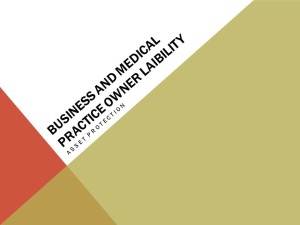 During my practice with a client base of thousands of doctors I have seen the best and the worst of asset protection planning available to the American public as well as the most common flaws evident in both self-directed planning and plans executed by “professionals” who do not practice primarily in this area.
During my practice with a client base of thousands of doctors I have seen the best and the worst of asset protection planning available to the American public as well as the most common flaws evident in both self-directed planning and plans executed by “professionals” who do not practice primarily in this area.
Below is the first part of a short summary of “fatal flaws” to keep in mind when addressing this crucial issue. Please bear in mind that information in forums like this is not specific to you, is written in the broadest terms and is never a substitute for consulting with an experienced professional:
1. FAILING TO ACT (Timing) — Asset Protection is best analogized to “net worth insurance” and like insurance you have the best, most effective and legally supportable options available to you when you implement the planning before a crisis exists. Transfer of assets into plans after you have specific exposures is costly, ineffective, and some cases illegal (fraudulent conveyance). The best time to act is always now and every day that passes makes your planning stronger.
2. THINKING YOU’RE NOT RICH ENOUGH — A sin I see committed on a weekly basis, often by professionals like lawyers, CPAs, and financial advisors. Advisors often tell clients that they are not rich enough to do any planning and that that they should have a net worth north of $5 million or even $10 million to consider it. Nothing could be further from the truth, especially if you are in the “fall” of your earning career. All you have is important to you and there are precautions that can be taken at any net worth level. When should you start? There are many simple ways to analyze this but here is an easy one, answer these questions:
• If you lost what you have today, or some significant portion of it, are you at an age, earning level, and financial condition that will allow you to maintain your family’s goals and expenses?
• Do you have assets that would be difficult or impossible to replace given your age, health, and economic conditions?
• Are you financially and legally prepared for a lawsuit that is either uncovered by liability insurance or which often produces verdicts above the limit you are carrying?
If you’re not comfortable with your answers, it’s time to take responsibility and action for your financial future.
3. RELYING ON YOUR TRADITIONAL ESTATE PLANNING — “I’ve got this covered, I think. I have my home, cars, and investments all titled in my trust.” This is something we hear often. The layperson usually feels that a transfer of these assets to a vehicle like an estate planning trust, like a Revocable Living Trust, is effective asset protection; it’s not. The first word in the trust is “revocable” and in most cases a judge will simply order you to revoke the trust and tender the assets for a judgment. That is death planning. What has been done about your life planning and the exposures you face every day practicing your profession, driving a car, having children (some driving your car), or having employees…?
4. TOO MANY EGGS IN ONE BASKET— Others implement a good tool like an LLC as a barrier between themselves and their investments, but fail to adequately segregate and subdivide assets so that they are protected from the owner and each other. A common example is the case of the property owner who has single LLC that is legally and financially responsible for a wide variety of properties that have different levels of liability, equity, and use. If you call and say you have $5,000 to 10,000 down on four new short sale properties in a single LLC, it’s probably OK, because your total exposure is theoretically limited to $20,000 to $40,000, the value of the LLC’s assets. On the other hand, if you call and say that you have seven pieces of real estate with a total equity position of six or seven figures, some paid for, some all debt, including a triplex, a lot, and a commercial strip mall, I’m going to start sweating on your behalf. Why? Because any exposure at a new, zero equity property could wipe out your entire portfolio of paid for or partially paid for properties. Assets must be divided based on use and equity as well as into the right kind of legal vehicle, among many other factors.
5. SQUARE PEG, ROUND HOLE — USING THE WRONG TOOL — Certain vehicles have great use for specific business functions supported by statute, tax law, and case history. You and your planner must have a good handle on these issues and know what pros and cons each entity presents, what the effect on your liquidity will be, and what it will take to maintain and support that stated business purpose as a start (Starting to see the detail required?). One good example is the common misuse of Family Limited Partnerships (FLP) to own the client’s personal residence. What is the legitimate business purpose of using a vehicle that is most often created for “family investment management and wealth transfer” to own the house you personally live in? If you’re not paying commercially reasonable rent, you don’t have one. The plaintiffs (or worse, the IRS) will successfully argue that you are using the FLP as personal piggy bank that is not legally distinct and immune from your personal assets and liabilities.
6. DRAGGING LIABILITY INTO YOUR PLAN — Similarly, we often see dangerous articles of personal property like your personal vehicles moved into this structure or others like an LLC or S-Corp. that is your primary business, or equally dangerous, into an entity like an FLP that is holding safe and attractive assets like cash, stocks, bonds, and other liquid assets. Think about it, if you lease or own your vehicle through your business, you have linked the most dangerous thing you likely do on a daily basis, drive a car, and linked it to either the source of your wealth, your business, or in the case of your FLP, the place you keep your wealth.
7. RELYING ON GIFTING TO RELATIVES (SEE ALSO FAILING TO ACT) — Transferring all of your assets to your spouse and/or children, especially after something has happened, will not protect your assets from a lawsuit and simply opens up another Pandora’s Box. There are thousands of lawsuits filed daily due to employment grievances, “slip and fall,” and auto accidents. Consider this scenario: Let’s suppose that you transfer all of your assets to your 18-year-old son who causes an auto accident. Several other cars are involved in the accident and several injuries are incurred. Chances are high that the other parties will come looking for the driver with the deepest pockets. If your son “owns” your house and business, a sympathetic jury will undoubtedly take the possession away from your son in order to teach him a lesson for his reckless driving. The same holds true for spouses, parents, and even friends. Also, gifting is limited to about $13,500 annually, per spouse, per donee. Gifts over that amount must be documented with a gift tax return. Failing to do so will result in you having to answer the question: “Are you lying now re: the date and validity of this transfer or did you cheat the IRS?” This is a bad place to be in a time of need.
8. USING UNPROVEN, POORLY STRUCTURED TOOLS OR SCAMS LIKE “FRIENDLY LIENS” — Another common scam I see is promoters of LLC mills setting up LLCs that you or a friendly party own and then having that entity record a “lien” against some valuable asset, typically real estate. While validly recorded and executed liens do have great deterrent power against creditors, they have to be backed by a real exchange of value. So if your brother-in-law owns a Nevada LLC that holds a lien on your home for most of its value, there should have been some exchange or “consideration” roughly equal to the amount of the lien. “Your sister has a $300,000 lien against the $400,000 home you live in? Uh, OK…then where’s the record of the $300,000 she gave you, as a bank would have in a real home equity loan? She didn’t give you anything in return? Great, we’ll take the house.”
This article just scratches the surface of what you need to consider when evaluating your exposures, asset protection planning, and the countless options available. Act today, seek experienced counsel, and keep looking for more light and information that will help you and your family keep and enjoy the fruits of your labors. Remember, it’s not just what you make; it’s also what you keep!
Asset Protection only attorney Ike Devji has ten years of practice devoted exclusively to Asset Protection and Wealth Preservation planning. He works with a national client base including 1000’s of physicians and business owners often through their local attorney, CPA or financial advisor. Together, he and his associates protect billions in personal assets for these clients. Ike also regularly writes, teaches and speaks on these issues to physicians and other professionals nationally. See his work in WORTH, Advisor Today, Physician’s Practice and at www.ProAssetProtection.Com
As always, the information presented here is general and educational and can never replace the advice of experienced counsel specific to your assets or situation. This article originally appeared at www.PhysiciansPractice.Com where Ike Devji is a regular contributor, and is reprinted here with permission. This was originally published in Jan, 2011 and is the kind of material Ike has taught for a decade as an expert speaker and educator for medical groups.


